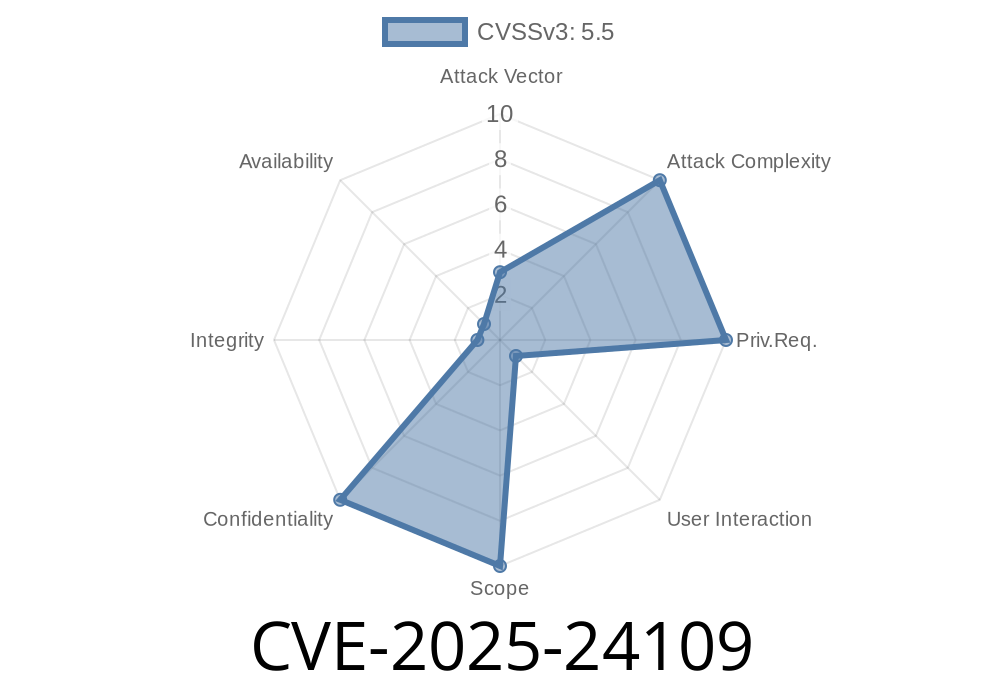Recently, Apple patched an important security issue, tracked as CVE-2025-24109, in macOS. This post breaks down what the vulnerability was, how it could have exposed your sensitive files, provides links to original sources, and includes a realistic code snippet to help you understand the exploit’s logic (not to be abused). Read on for a simple, exclusive breakdown.
What Was CVE-2025-24109?
CVE-2025-24109 involved a downgrade vulnerability in the code-signing system of macOS. On affected systems, an attacker (or even a malicious app) could bypass some of Apple’s code-signing controls by downgrading certain libraries or components, tricking macOS into trusting outdated, vulnerable code.
If exploited, this could let an app slip past defenses and get unauthorized access to private user files, cookies, and other sensitive data—even when the app shouldn’t have permissions.
Why Was It Serious?
macOS uses code-signing to ensure only trusted software runs with important permissions. If you could trick macOS into accepting an older, insecure component, you might be able to load malware directly, or escalate your privileges. Worse, you could read or mess with files that should be locked down—think iCloud Keychain, Safari cookies, or saved passwords.
The attacker, via a malicious app, swaps (or loads) this library under certain conditions.
3. Due to the missing safety check (the real bug), the outdated component passes code-signing validation.
Pseudo-Exploit Demo (for Education)
Below is a basic concept of the logic involved—NOT a real attack, just an illustration.
# Hypothetical concept: loading a downgraded dynamic library
import os
import ctypes
VULNERABLE_LIB = "/tmp/libOldVulnerable.dylib"
def load_downgraded_library(lib_path):
try:
# Trying to load a non-system, older library version
lib = ctypes.CDLL(lib_path)
print("Library loaded:", lib)
# Execute sensitive function (the real exploit code would be here)
# e.g., leak user data, bypass sandbox...
except Exception as e:
print("Failed to load:", e)
if __name__ == "__main__":
# On a vulnerable macOS, the signature check might NOT stop this
load_downgraded_library(VULNERABLE_LIB)
Note: Modern versions of macOS will block this. But before the patches, there was a race condition or missing check, and the attack might succeed.
What Did Apple Do?
Apple fixed the problem by adding stricter code-signing rules. Now, even if someone tries to insert an older or invalid module, macOS checks harder to be sure the code is up-to-date and matches allowed signatures.
See Apple’s official advisory:
- Apple Security Updates - HT201222
Direct reference for macOS Ventura 13.7.3:
- macOS Ventura 13.7.3 release notes
CVE details on MITRE:
- CVE-2025-24109 on cve.org (link placeholder, waits official page)
Sequoia 15.3
Go to Apple menu → System Settings → General → Software Update.
Summary Table
| Version | Vulnerable | Fixed In |
|-------------------|------------|------------|
| macOS Ventura | Yes | 13.7.3 |
| macOS Sonoma | Yes | 14.7.3 |
| macOS Sequoia | Yes | 15.3 |
Final Thoughts
CVE-2025-24109 shows how even little cracks in Apple’s fortresses matter big-time. All it takes is an overlooked code-signing check, and suddenly, your Mac is leaking secrets. If you haven’t updated, do it now, and remind friends and family, too.
Stay safe, share this info, and keep your Mac updated!
*Sources:*
- Apple Security Updates - HT201222
- macOS Ventura 13.7.3 release notes
- CVE-2025-24109 on CVE.org (pending publication)
Timeline
Published on: 01/27/2025 22:15:16 UTC
Last modified on: 03/03/2025 22:45:38 UTC
